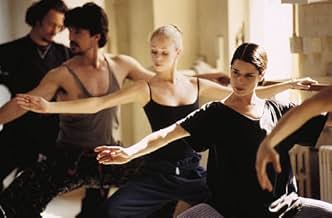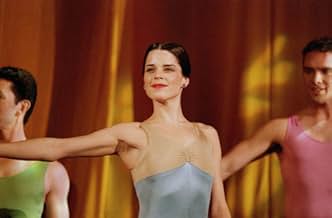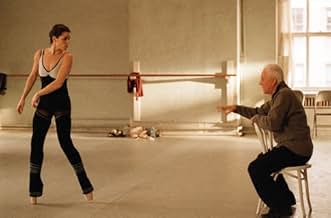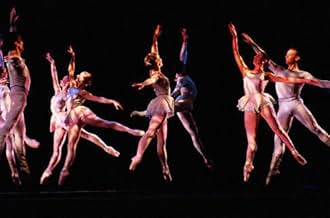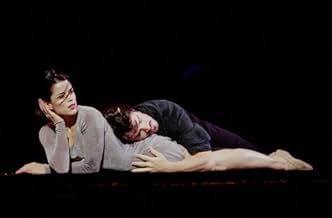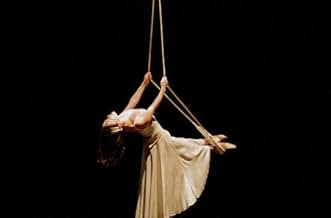IMDb RATING
6.2/10
7K
YOUR RATING
A young ballet dancer is poised to become the principal performer in a group of ballet dancers.A young ballet dancer is poised to become the principal performer in a group of ballet dancers.A young ballet dancer is poised to become the principal performer in a group of ballet dancers.
- Awards
- 2 nominations total
Barbara E. Robertson
- Harriet
- (as Barbara Robertson)
Davis C. Robertson
- Alec - Joffrey Dancer
- (as Davis Robertson)
Featured reviews
George, what I think you meant to say was that you are actually a thick-headed mocho-man who has NO appreciation for the arts whatsoever. If you did, you'd understand that the ballet dancing in this movie was beautiful, and entitled a lot of hard work on the dancers' part. I've danced since I was three, and have met many male dancers along the way, and, to inform you, NOT ONE OF THEM WAS GAY! I'm a STRAIGHT female who has dated a male dancer before. Assumptions like that are completely childish. THe acting, dancing, setting, and costumes in this movie were wonderful. If you can't even appreciate fine movie-making, then you are surely at a loss. Even if you would rather be watching sports, which I completely understand, most men would, that's fine: however, it doesn't give you the right to judge an a form of art that you abviously don't understand.
I'm no dance critic, but. . . I was very disappointed with the choice of "The Blue Snake" as the ultimate and climactic "number" in "The Company". To me, it really stood out as the least interesting and most cliched of all the dances in the film. Those outrageous costumes! That "Ice Capades" choreography! Altman & Co. really ought to have chosen a piece that would have shown the Joffrey's more adventuresome side.
I went into this film knowing that it was a "dance movie" with minimal storyline, and I was still disappointed. It's not a good sign when I start looking at my watch halfway through a film. It doesn't bother me that a "dance film" eschews the Melodrama of "The Turning Point" or "A Chorus Line." But "The Company" also eschews Interest! There was basically nothing to "hang onto" outside the dance sequences. Only Ry (Neve Campbell's character) was given any appreciable screentime, and aside from a few quiet moments, she wasn't given very much to do.
Okay, I admit that I liked one dramatic scene a lot: a flirtatious moment between Ry and Josh - the chef who looks like a male model - which takes place in a dive bar. There should have been more scenes like that.
I rate the film a 6 - dramatically disappointing, while the quality of the dance sequences varies from sublime to ridiculous.
I went into this film knowing that it was a "dance movie" with minimal storyline, and I was still disappointed. It's not a good sign when I start looking at my watch halfway through a film. It doesn't bother me that a "dance film" eschews the Melodrama of "The Turning Point" or "A Chorus Line." But "The Company" also eschews Interest! There was basically nothing to "hang onto" outside the dance sequences. Only Ry (Neve Campbell's character) was given any appreciable screentime, and aside from a few quiet moments, she wasn't given very much to do.
Okay, I admit that I liked one dramatic scene a lot: a flirtatious moment between Ry and Josh - the chef who looks like a male model - which takes place in a dive bar. There should have been more scenes like that.
I rate the film a 6 - dramatically disappointing, while the quality of the dance sequences varies from sublime to ridiculous.
I love movies about dancers, but usually my favorites are a bit more sugarcoated than The Company. This one was a very refreshing change as it portrays dancers in a ballet company so realistically it feels like a documentary. Most of the actors are real dancers, and they don't act like there's a camera following them around. There are long scenes of rehearsals with bickering, silences followed by interrupted dialogue, mumbling, and dead time while we watch men and women stretching or putting on their shoes. If that sounds boring to you, stick with the Step Up franchise.
I really enjoyed The Company because of the realism. I knew Neve Campbell came from a ballet background, and I was very excited to see her showing off her hidden talents. James Franco does not, unfortunately, strap on a pair of flats and join in on the fun; instead he's Neve's boyfriend in the few scenes that show her enjoying her down time. Malcom MacDowell is the company director, and he's very believable as a passionate, demanding choreographer.
There's a scene that has stayed with me through the years: while rehearsing on stage as the performance grows nearer, a dreadful snap is heard, and one of the dancers collapses and cradles her leg. It's not drawn out dramatically or showcased in a closeup, and because of the lack of special attention, it feels so much more real and accidental. If you like ballet documentaries, or you really appreciate realism to the point of boredom, you might want to check out this movie.
I really enjoyed The Company because of the realism. I knew Neve Campbell came from a ballet background, and I was very excited to see her showing off her hidden talents. James Franco does not, unfortunately, strap on a pair of flats and join in on the fun; instead he's Neve's boyfriend in the few scenes that show her enjoying her down time. Malcom MacDowell is the company director, and he's very believable as a passionate, demanding choreographer.
There's a scene that has stayed with me through the years: while rehearsing on stage as the performance grows nearer, a dreadful snap is heard, and one of the dancers collapses and cradles her leg. It's not drawn out dramatically or showcased in a closeup, and because of the lack of special attention, it feels so much more real and accidental. If you like ballet documentaries, or you really appreciate realism to the point of boredom, you might want to check out this movie.
The DVD extras with some movies make the film seem better than it did just watching it. "The Company" is a good example.
I'd wondered, briefly, why star Neve Campbell also got producer credit. The DVD 'making of' documentary explains that the whole project was her idea; she'd been a dancer long before she took up acting, and wanted to combine the two. She chose Altman to direct, because of his skill at portraying relations and interactions among people in groups.
Altman did a fine job depicting dance, both rehearsals and performances. Campbell showed she can still dance. Malcolm McDowell gave a great performance as the acerbic company director. The Joffrey dancers were brilliant. Altman has created a dazzling cinematic album of what the world of dance is like at the beginning of the 21st century.
But the story arc was weak. This was no accident. In a recent (October 2004) interview, Altman said:
Question: "Why do you think you're drawn to stories about big groups of people sharing the same space? Did it have anything to do with growing up in such a large, close-knit family?"
Robert Altman: "Possibly. I don't know. That's a little too cerebral for me. I'm not much interested in stories anyway. I'm more interested in reactive behavior."
That sums up "The Company" very nicely. The movie is a montage of scenes of "reactive behavior" among realistic characters, and in this it is more like real life than a more structured story would have been.
Of course there is some story structure here, involving the creation of a new dance. This story is engaging, because the outside choreographer is a fey flake, and dance disaster seems foredoomed. But the dancers, being good soldiers, follow his orders diligently. And despite all expectations, at least all of my expectations, their climactic performance is superb.
But this story is not central to the movie. Again like life, it unfolds amidst all sorts of other organizational and interpersonal drama.
And for this reason the movie left me unsatisfied. Part of what I look for in movies, and in books, is a story arc: a beginning, a middle, and an end. I look for this precisely because life is rarely that neat. Many directors deliver this arc (and many more try to, and fail). Robert Altman chose not to try. He is free to do that, and I am free to rate this movie 7/10.
I'd wondered, briefly, why star Neve Campbell also got producer credit. The DVD 'making of' documentary explains that the whole project was her idea; she'd been a dancer long before she took up acting, and wanted to combine the two. She chose Altman to direct, because of his skill at portraying relations and interactions among people in groups.
Altman did a fine job depicting dance, both rehearsals and performances. Campbell showed she can still dance. Malcolm McDowell gave a great performance as the acerbic company director. The Joffrey dancers were brilliant. Altman has created a dazzling cinematic album of what the world of dance is like at the beginning of the 21st century.
But the story arc was weak. This was no accident. In a recent (October 2004) interview, Altman said:
Question: "Why do you think you're drawn to stories about big groups of people sharing the same space? Did it have anything to do with growing up in such a large, close-knit family?"
Robert Altman: "Possibly. I don't know. That's a little too cerebral for me. I'm not much interested in stories anyway. I'm more interested in reactive behavior."
That sums up "The Company" very nicely. The movie is a montage of scenes of "reactive behavior" among realistic characters, and in this it is more like real life than a more structured story would have been.
Of course there is some story structure here, involving the creation of a new dance. This story is engaging, because the outside choreographer is a fey flake, and dance disaster seems foredoomed. But the dancers, being good soldiers, follow his orders diligently. And despite all expectations, at least all of my expectations, their climactic performance is superb.
But this story is not central to the movie. Again like life, it unfolds amidst all sorts of other organizational and interpersonal drama.
And for this reason the movie left me unsatisfied. Part of what I look for in movies, and in books, is a story arc: a beginning, a middle, and an end. I look for this precisely because life is rarely that neat. Many directors deliver this arc (and many more try to, and fail). Robert Altman chose not to try. He is free to do that, and I am free to rate this movie 7/10.
Lets hope that Altman makes films for another 20 years and that he stays as adventuresome as he currently is.
In 'The Long Goodbye' Altman invented a rather new camera stance, literally asking the actors to improvise staging and having the camera discovering them.
It took a few decades for him to get back to such experiments with 'Gosford.' Now he takes it even further with perhaps the purest problem in film cinematography: how do you film dance?
Forget that this features Campbell in a vanity role: she is good enough and doesn't detract. Forget about any modicum of plot: there isn't any. And unlike 'Nashville' or the similarly selfreferential 'Player' there is no cynical commentary.
The commentary itself is selfreferential this time. Yes, this time the center of the film is how 'Mr A' orchestrates movement and images. This is most of all about himself, and is far, far more intelligent and subtle than say, 'Blowup.'
But along the way, you get possibly the best dance experience on film. That's because they've been able to use many cameras. There are not as many as 'Dancer in the Dark,' but each camera dances, engages with the dance and the dance of people and objects around the dance. So we get four layers of dance: the actual ballet, the orchestration of people around the production, the dancing cameras (enhanced by non-radical appearing radical editing) and the dance within the mind of Mr A who encourages, follows and captures them all.
Ted's Evaluation -- 3 of 3: Worth watching.
In 'The Long Goodbye' Altman invented a rather new camera stance, literally asking the actors to improvise staging and having the camera discovering them.
It took a few decades for him to get back to such experiments with 'Gosford.' Now he takes it even further with perhaps the purest problem in film cinematography: how do you film dance?
Forget that this features Campbell in a vanity role: she is good enough and doesn't detract. Forget about any modicum of plot: there isn't any. And unlike 'Nashville' or the similarly selfreferential 'Player' there is no cynical commentary.
The commentary itself is selfreferential this time. Yes, this time the center of the film is how 'Mr A' orchestrates movement and images. This is most of all about himself, and is far, far more intelligent and subtle than say, 'Blowup.'
But along the way, you get possibly the best dance experience on film. That's because they've been able to use many cameras. There are not as many as 'Dancer in the Dark,' but each camera dances, engages with the dance and the dance of people and objects around the dance. So we get four layers of dance: the actual ballet, the orchestration of people around the production, the dancing cameras (enhanced by non-radical appearing radical editing) and the dance within the mind of Mr A who encourages, follows and captures them all.
Ted's Evaluation -- 3 of 3: Worth watching.
Did you know
- TriviaNeve Campbell lost thousands of dollars of her own money to ensure that her fellow cast members received their wages.
- GoofsAt about 1:10 while counting during a rehearsal, Harriet skips the 6th count of 8.
- Quotes
Alberto Antonelli: Ry, honey, let's scramble some ideas, instead of some asshole who contradicts me.
- Crazy creditsAfter the closing credits begin rolling, the dancers continue to take their final bows, and the audience continues to applaud.
- How long is The Company?Powered by Alexa
Details
- Release date
- Countries of origin
- Official sites
- Language
- Also known as
- The Company
- Filming locations
- Production companies
- See more company credits at IMDbPro
Box office
- Budget
- $15,000,000 (estimated)
- Gross US & Canada
- $2,283,914
- Opening weekend US & Canada
- $93,776
- Dec 28, 2003
- Gross worldwide
- $6,415,017
- Runtime1 hour 52 minutes
- Color
- Sound mix
- Aspect ratio
- 2.35 : 1
Contribute to this page
Suggest an edit or add missing content








